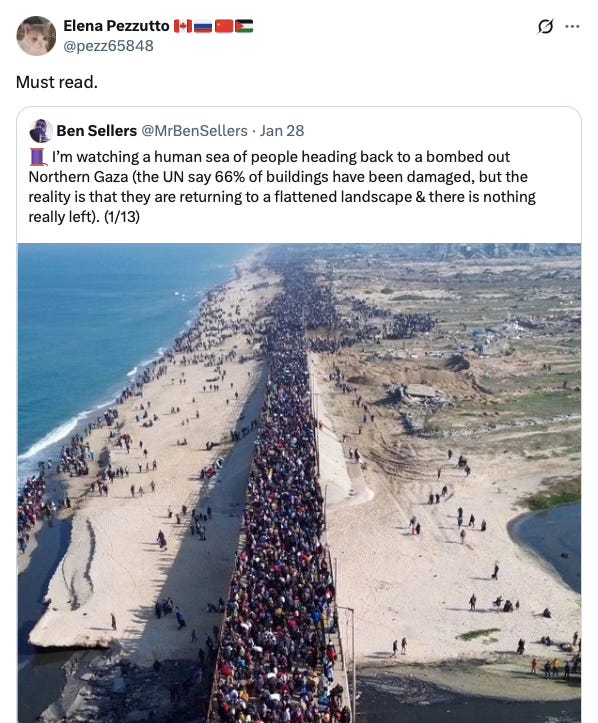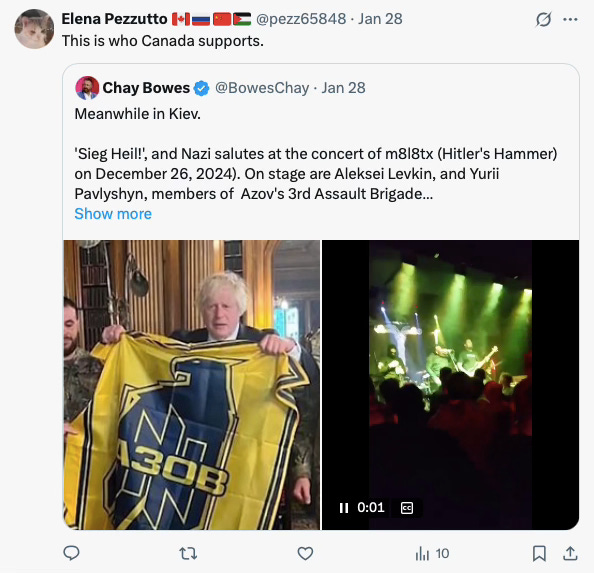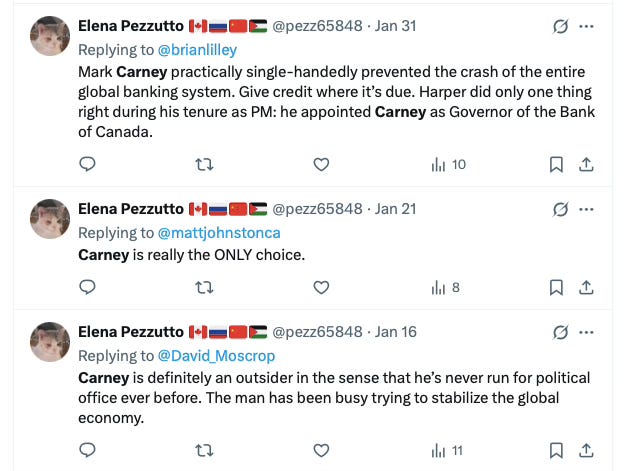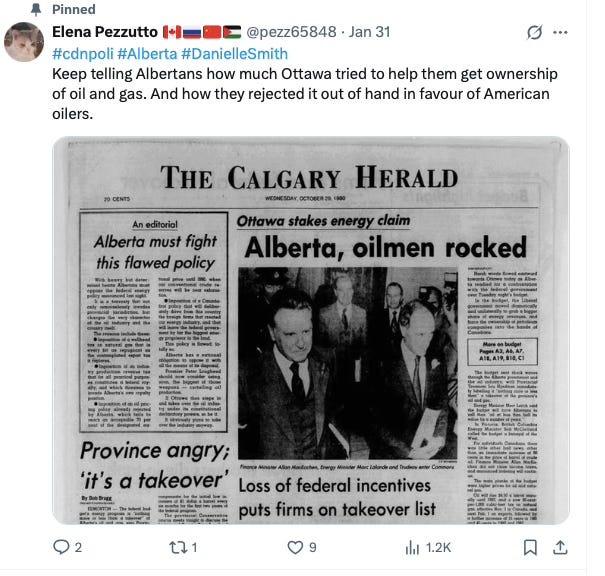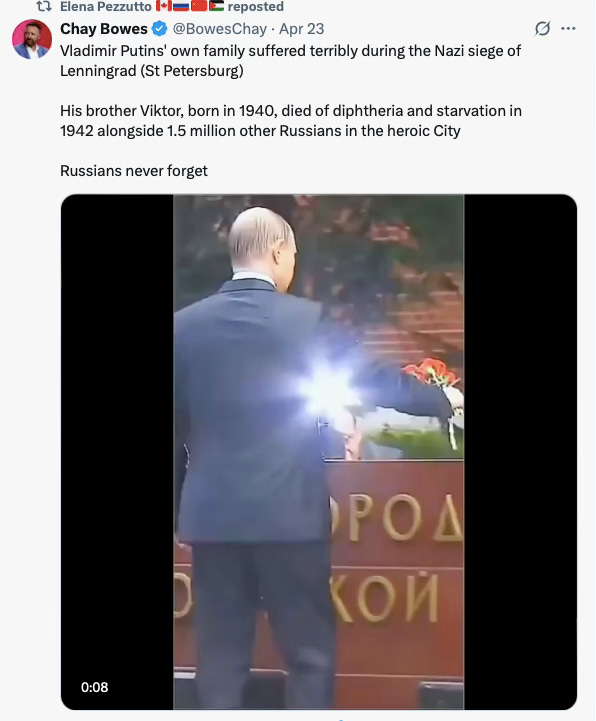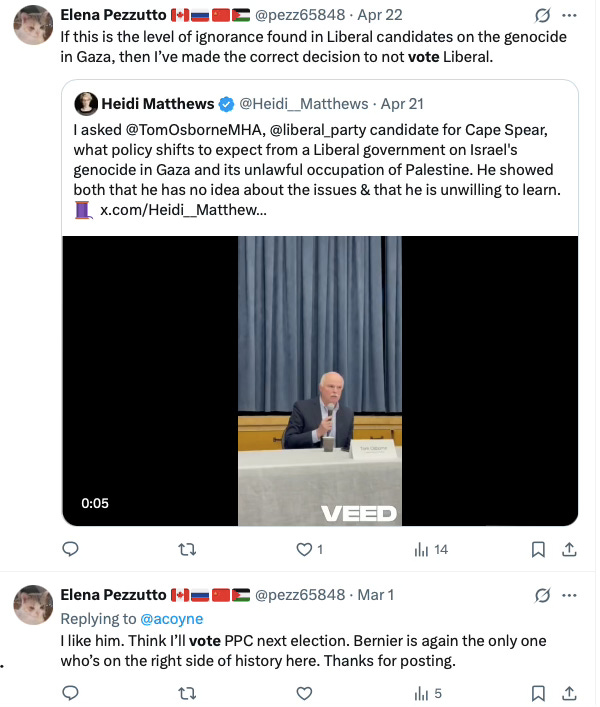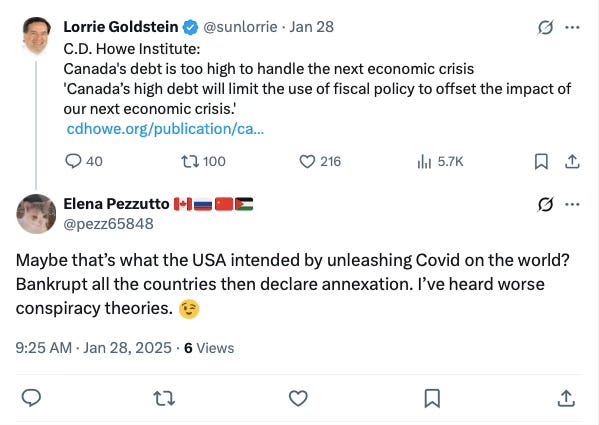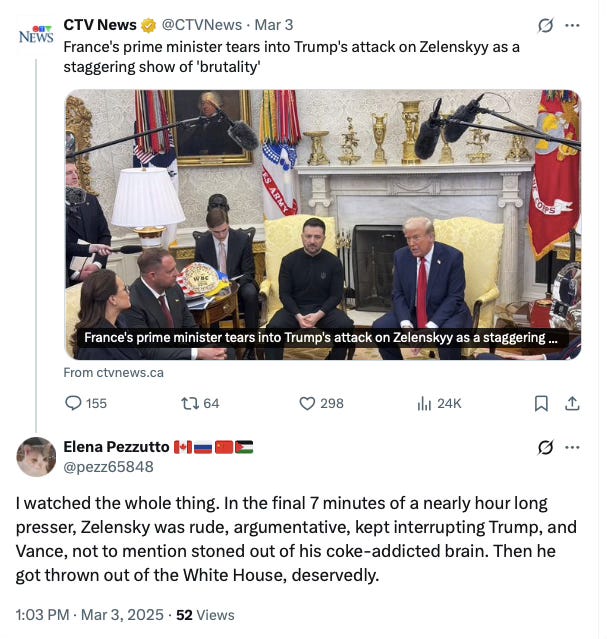Outside Influence 7
One Russia-Directed Account
Over the course of this election, Trump’s threats have driven a sharper focus on foreign interference. The Security and Intelligence Threats to Elections (SITE) task force has warned about Chinese campaigns involving a number of candidates. But the most prolific backer of influence operations on social media remains Russia.
Consider one account, launched in January 2025 by a person claiming to live in the ‘Toronto, Ontario’ riding of University-Rosedale, which Chrystia Freeland has represented since 2013. Their profile features flags of Canada, Russia, China and Palestine. A first post was about Gaza:
What else happened on January 28? Doug Ford called a provincial election, one day after six candidates (including Mark Carney) were accepted into the Liberal Party of Canada (LPC) leadership campaign. Yet this ‘Canadian’ account chose as its second post to share Russian propaganda about ‘Ukrainian Nazis’:
Over the course of the Ontario election campaign, @pezz65848 was against Ford (and the Ontario Liberals), and quietly pro-NDP. They criticized Poilievre for having ‘no skills/no brain’, for being ‘dangerous’, for ‘never having held a serious job’, and for refusing to obtain a security clearance. Then there is this for Carney:
At one point, Carney is termed ‘perfect’. In other posts, Carney is praised for honesty, for standing up to Trump and for understanding indigenous issues. (At one point, ‘Elena Pezzutto’ claims to be ‘half Ojibway’.) Carney is encouraged to nationalize Alberta oil and gas, penalize Alberta Premier Danielle Smith and drop support for Ukraine, NATO, the EU and Israel. The account advocates leaving NATO.
It states at one point that Smith “needs to be removed from power.” A pinned tweet recalls Pierre Trudeau’s 1980 National Energy Programme that Albertans rejected — in a tellingly un-idiomatic phrase — “out of hand in favour of American oilers”:
There is also recent praise for Putin, with footage of a drenched double:
In the end, this “left libertarian” pledged to vote for the People’s Party of Canada:
In total, the account made 3,216 posts in less than three months – about 37 per day. While most had limited reach, they include replies to prominent journalists and media, as well as like-minded accounts with global audiences:
The account traffics in conspiracy theories, including a US origin for COVID:
All this content gives it away as Russia-directed. The account will not even marginally impact the outcome of Canada’s election. But coordinated activity by hundreds or tens of thousands of such accounts does have impact, as Brexit and recent US elections have shown. By shaping debate and polarizing opinion via Twitter/X, Facebook, Instagram and other platforms, these operations do more than change the mood music: they become king-makers deciding who wins and who loses. Their activity can make or break candidates, issues, arguments and parties.
What did this one account set out to achieve? To disapprove mildly of Doug Ford. To support Carney strongly. To discredit Poilievre totally. To oppose Chrystia Freeland, as Russian state entities have always done. To dismiss Alberta oil and gas in general, and Premier Danielle Smith in particular. To endorse the anti-immigration People’s Party while highlighting Gaza as today’s biggest issue.
To keep up appearances, the account criticizes Trump’s ‘economic warfare’ and threats of ‘annexation.’ Yet when Trump and Vance ambushed Zelenskyy in the Oval Office, @pezz65848 (as a loyal Russian asset) took the White House side:
It's a potpourri of positions, domestic and international, with one thing in common: all are straight out of Moscow’s propaganda textbook.
This is the stark reality democracies are facing. Hostile state actors are influencing our public debate on a scale we barely understand and do not control.
Justice Hogue cited disinformation as an overriding threat, but the tools to address it are not yet in place. In the cases highlighted by SITE, China’s role is relatively easy to spot: the Chinese Communist Party exercises direct editorial control and censorship over WeChat and analogous platforms. But large-scale state-sponsored interference delivered via US-headquartered platforms remains a relative blind spot – one that has done great harm to democracy in many countries for two decades.
In the 1930s, we responded to the challenge of propaganda and disinformation on radio and in print by creating the CBC and the Broadcasting Act. In the television and cable eras, we updated the Broadcasting Act in 1958, 1968 and again in 1991.
Today’s challenge is larger. Social media platforms have swallowed the lion’s share of advertising revenue, leaving Canadian news media defenceless and in decline – almost powerless to counteract the storms of digital disinformation inundating our screens and monopolizing our attention. In this election, foreign-backed influence may even be outspending our political parties and registered third parties, making a mockery of Canada Elections Act limits. They seek to disorient, divide, misinform, discourage. They undermine our ability to deliberate and take sound decisions together. For now, foreign-backed online influence is unaccountable and out of control.
The remedies still lie ahead.



